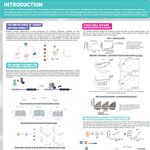Project Scientist, Board of Governors Regenerative Medicine Institute, Cedars-Sinai Medical Center
BIOGRAPHY
Date: November 13, 2024 | Time: 10:00am PT, 1:00pm ET,
Single Cell Multiomic characterization of pediatric gliomas uncover novel, subtype-specific therapeutic approaches
Speaker
Event Date & Time
Date: November 13, 2024
Time: 10:00am PT, 1:00pm ET
Abstract
Brain tumors are the leading cause of solid-tumor-related deaths among children. These tumors are now categorized by WHO as separated from adult brain tumors and based on their distinct molecular features, including K27M and G34R mutations in the histone H3.3. These tumors, despite similar mutational landscapes, differ significantly in their development and location, resulting in fast-growing diffuse midline gliomas and slower-developing diffuse hemispheric gliomas, respectively.
To address the limitations of current cancer modeling technologies, specially in these tumors, we developed Mosaic Analysis using Dual Recombinase-mediated cassette exchange (MADR). It enabled us to develop precise single-copy transgenesis to generate murine gliomas which highly mimic the human diseases. Here we aimed to do and “apples-to-apples” characterization of the internal heterogeneity of these tumors at the single-cell level validating our findings using human datasets.
scRNAseq and snATACseq analyses revealed striking similarities in the transcriptional and epigenetic profiles of the tumors, as well as in their internal heterogeneity. However, different epigenetic aproaches presented clear differences between the tumor subtypes that correlated with RNA expression changes. Interestingly, DNA Methylation profiling of the tumors discovered specific and differential therapeutic targets for K27M, G34R and H3.3 WT tumors. This results were validated in human datasets and in vitro functional studies in our murine models.
The present study emphasizes the importance of understanding the internal heterogeneity of pediatric gliomas for the development of personalized therapies. We have extensively characterized the global and specific heterogeneity among these tumors, including the primary role of the epigenetic alterations promoted by H3.3 mutations in their evolution.
Learning Objectives
- Introduction to single cell multi-omic strategies that can be used to better understand tumor complexity
- How single cell methylation coupled with single cell RNA analysis reveals specific therapeutic targets in pediatric glioma tumors
- How ScaleBio’s single cell solutions enable large-scale analysis of highly complex disease systems
Webinars will be available for unlimited on-demand viewing after live event.
You May Also Like
FEB 25, 2025 | 1:00 PM
C.E. CREDITS
Quality efforts in the clinical laboratory are always under the microscope- a hyper-focus for laboratorians from start to finish. Recognizing the external factors that affect hemostasis test...
Join this year's poster presenters in the Poster Hall during the Poster Networking Hour, Wednesday, September 20th, from 10:00 AM –11:00 AM PDT , to chat live about their posters a...
Join this year's poster presenters in the Poster Hall during the Poster Networking Hour, Wednesday, March 5th, from 10:00 –11:00 AM PDT , to chat...
Loading Comments...





